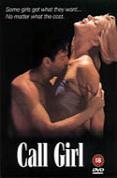 Call Girl | DVD | (05/07/2005)
from £N/A
| Saving you £N/A (N/A%)
| RRP
Call Girl | DVD | (05/07/2005)
from £N/A
| Saving you £N/A (N/A%)
| RRP When erotic photographer Diandra Jensen (Melanie Hall) has her first big exhibition art collector Arthur Benton (Jay Huguley) buys one of Diandras pictures. He is complimentary of her work but thinks her career has only begun. He points her in a new exciting direction.
 XPW - After The Fall Vol.2 | DVD | (22/10/2007)
from £18.99
| Saving you £-11.00 (N/A%)
| RRP
XPW - After The Fall Vol.2 | DVD | (22/10/2007)
from £18.99
| Saving you £-11.00 (N/A%)
| RRP More intense Wrestling action from XPW.
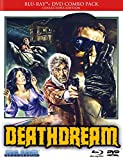 DVD/BLU-RAY - DEATHDREAM (AKA DEAD OF NIGHT) (LTD) (1 DVD) | Blu Ray | (28/11/2017)
from £N/A
| Saving you £N/A (N/A%)
| RRP
DVD/BLU-RAY - DEATHDREAM (AKA DEAD OF NIGHT) (LTD) (1 DVD) | Blu Ray | (28/11/2017)
from £N/A
| Saving you £N/A (N/A%)
| RRP ![The Zombie Chronicles - Swamp Zombie / Forever Dead / Stiff Odds [DVD] [2004]](/pictures/1094126.jpg) The Zombie Chronicles - Swamp Zombie / Forever Dead / Stiff Odds | DVD | (08/06/2009)
from £N/A
| Saving you £N/A (N/A%)
| RRP
The Zombie Chronicles - Swamp Zombie / Forever Dead / Stiff Odds | DVD | (08/06/2009)
from £N/A
| Saving you £N/A (N/A%)
| RRP Titles Comprise: The Zombie Chronicles The Forever Dead Stiff Odds
 Rehearsal For Murder | DVD | (01/09/2003)
from £N/A
| Saving you £N/A (N/A%)
| RRP
Rehearsal For Murder | DVD | (01/09/2003)
from £N/A
| Saving you £N/A (N/A%)
| RRP ![The Sopranos: Series 2 (Vols. 1-3) [2000]](/pictures/1020094.jpg) The Sopranos: Series 2 (Vols. 1-3) | DVD | (23/07/2001)
from £N/A
| Saving you £N/A (N/A%)
| RRP
The Sopranos: Series 2 (Vols. 1-3) | DVD | (23/07/2001)
from £N/A
| Saving you £N/A (N/A%)
| RRP The second series of The Sopranos, David Chase's ultra-cool and ultra-modern take on New Jersey gangster life, matches the brilliance of the first, although it's marginally less violent, with more emphasis given to the stories and obsessions of supporting characters. Sadly, the programme makers were forced to throttle back on the appalling struggle between gang boss Tony Soprano and his Gorgon-like Mother Livia, the very stuff of Greek theatre, following actress Nancy Marchand's unsuccessful battle against cancer. Taking up her slack, however, is Tony's big sister Janice, a New Age victim and arrant schemer and sponger, who takes up with the twitchy, Scarface-wannabe Richie Aprile, brother of former boss Jackie, out of prison and a minor pain in Tony's ass. Other running sub-plots include soldier Chris (Michael Imperioli) hapless efforts to sell his real-life Mafia story to Hollywood, the return and treachery of Big Pussy and Tony's wife Carmela's ruthlessness in placing daughter Meadow in the right college. Even with the action so dispersed, however, James Gandofini is still toweringly dominant as Tony. The genius of his performance, and of the programme makers, is that, despite Tony being a whoring, unscrupulous, sexist boor, a crime boss and a murderer, we somehow end up feeling and rooting for him, because he's also a family man with a bratty brood to feed, who's getting his balls busted on all sides, to say nothing of keeping the Government off his back. He's the kind of crime boss we'd like to feel we would be. Tony's decent Italian-American therapist Dr Melfi's (Loraine Bracco) perverse attraction with her gangster-patient reflects our own and, in her case, causes her to lose her first series cool and turn to drink this time around. Effortlessly multi-dimensional, funny and frightening, devoid of the sentimentality that afflicts even great American TV like The West Wing, The Sopranos is boss of bosses in its televisual era. --David Stubbs
![Loretta Lynn-Coalminer's Daughter [DVD]](/pictures/1130435.jpg) Loretta Lynn-Coalminer's Daughter | DVD | (21/11/2005)
from £10.61
| Saving you £-2.36 (N/A%)
| RRP
Loretta Lynn-Coalminer's Daughter | DVD | (21/11/2005)
from £10.61
| Saving you £-2.36 (N/A%)
| RRP Track Listing: 1. Hey Loretta 2. You're Looking At Country 3. We've Come A Long Way Baby 4. Let Your Love Flow 5. You Ain't Woman Enough 6. Medley: I Fall To Pieces / Walking After Midnight / Crazy 7. Me Abd Bobby McGee 8. Out Of My Head And Back In My Bed 9. Coal Miner's Daughter 10. They Don't Make 'Em Like My Daddy Anymore 11. Medley: One's On The Way / The Pill / Don't Go Home A Drinkin'
![Rehearsal For Murder [DVD] [1982]](/pictures/1106221.jpg) Rehearsal For Murder | DVD | (14/02/2011)
from £8.07
| Saving you £-6.08 (-305.50%)
| RRP
Rehearsal For Murder | DVD | (14/02/2011)
from £8.07
| Saving you £-6.08 (-305.50%)
| RRP One year after the supposed suicide of his fiance a playwright gathers together the cast from his last play in order to find out what really happened on that fateful night.
![Taking Off [Blu-ray]](/pictures/1111304.jpg) Taking Off | Blu Ray | (07/11/2011)
from £18.88
| Saving you £1.11 (5.88%)
| RRP
Taking Off | Blu Ray | (07/11/2011)
from £18.88
| Saving you £1.11 (5.88%)
| RRP Now available for the first time on Blu-ray in the UK, Taking Off is acclaimed director Milos Forman’s (One Flew Over the Cuckoo’s Nest, Amadeus) first US feature. This 1971 comedy-drama stars Lynn Carlin and Buck Henry as middle-class New York suburbanites, whose teenage daughter runs away from home when she gets in trouble with her parents. In the process of trying to unravel the mystery of the girl's whereabouts, the couple rediscover their own lives. This funny, alternative coming-of-age tale features exclusive musical appearances from Tina & Ike Turner, Carly Simon and actress Kathy Bates (as ‘Bobo’ Bates). This Blu-ray edition features a brand new HD restoration of the film along with the following extras: * Trailer * Before Taking Off: Milos Forman’s Road To America (30 minute documentary) * Photo Gallery
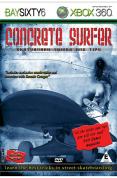 Concrete Surfer - Skateboard Tricks And Tips | DVD | (23/06/2008)
from £17.53
| Saving you £-4.54 (N/A%)
| RRP
Concrete Surfer - Skateboard Tricks And Tips | DVD | (23/06/2008)
from £17.53
| Saving you £-4.54 (N/A%)
| RRP If you've ever dreamed of being able to skateboard like a pro Concrete Surfer is an indispensable guide. Start with the basic tricks - riding the board pushing off stepping on and off turning--and progress on to more advanced stunts. Pretty soon you'll be carving through the streets performing ollies nollies and kick flips like you've been doing it all your life!
![Somebody Is Waiting [1996]](/pictures/1018887.jpg) Somebody Is Waiting | DVD | (01/09/2003)
from £N/A
| Saving you £N/A (N/A%)
| RRP
Somebody Is Waiting | DVD | (01/09/2003)
from £N/A
| Saving you £N/A (N/A%)
| RRP Leon Ellis is a kind-hearted well-intentioned boy who just can't seem to stay out of trouble. His mother Charlotte is the soul of goodness dedicated to her five children but burdened with the sorrows of her cruel and nasty alcoholic husband who leaves the family destitute. However when Charlotte dies Leon must learn to take care of his family and himself.
![The Sopranos: Series 2 (Vol. 1) [2000]](/pictures/1020281.jpg) The Sopranos: Series 2 (Vol. 1) | DVD | (21/05/2001)
from £6.03
| Saving you £6.96 (115.42%)
| RRP
The Sopranos: Series 2 (Vol. 1) | DVD | (21/05/2001)
from £6.03
| Saving you £6.96 (115.42%)
| RRP The second series of The Sopranos, David Chase's ultra-cool and ultra-modern take on New Jersey gangster life, matches the brilliance of the first, although it's marginally less violent, with more emphasis given to the stories and obsessions of supporting characters. Sadly, the programme makers were forced to throttle back on the appalling struggle between gang boss Tony Soprano and his Gorgon-like Mother Livia, the very stuff of Greek theatre, following actress Nancy Marchand's unsuccessful battle against cancer. Taking up her slack, however, is Tony's big sister Janice, a New Age victim and arrant schemer and sponger, who takes up with the twitchy, Scarface-wannabe Richie Aprile, brother of former boss Jackie, out of prison and a minor pain in Tony's ass. Other running sub-plots include soldier Chris (Michael Imperioli) hapless efforts to sell his real-life Mafia story to Hollywood, the return and treachery of Big Pussy and Tony's wife Carmela's ruthlessness in placing daughter Meadow in the right college. Even with the action so dispersed, however, James Gandofini is still toweringly dominant as Tony. The genius of his performance, and of the programme makers, is that, despite Tony being a whoring, unscrupulous, sexist boor, a crime boss and a murderer, we somehow end up feeling and rooting for him, because he's also a family man with a bratty brood to feed, who's getting his balls busted on all sides, to say nothing of keeping the Government off his back. He's the kind of crime boss we'd like to feel we would be. Tony's decent Italian-American therapist Dr Melfi's (Loraine Bracco) perverse attraction with her gangster-patient reflects our own and, in her case, causes her to lose her first series cool and turn to drink this time around. Effortlessly multi-dimensional, funny and frightening, devoid of the sentimentality that afflicts even great American TV like The West Wing, The Sopranos is boss of bosses in its televisual era. --David Stubbs
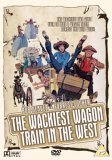 The Wackiest Wagon In The West | DVD | (05/07/2005)
from £15.93
| Saving you £-11.94 (-299.20%)
| RRP
The Wackiest Wagon In The West | DVD | (05/07/2005)
from £15.93
| Saving you £-11.94 (-299.20%)
| RRP Three episodes of ""Dusty's Trail"" (1973) coupled together into a feature film. In a similar situation to ""Gilligan's Island"" (1964) and even starring Bob Denver again Dusty is a bumbling assistant to Coachmaster Callahan on a stage and wagon. Thanks to Dusty's bungling they are soon seperated from the wagon train and lost in the wilderness. The characters parallel those of Gilligan's show.
![George King - Gaiety George [DVD]](/pictures/1093816.jpg) George King - Gaiety George | DVD | (24/08/2009)
from £14.98
| Saving you £-1.99 (N/A%)
| RRP
George King - Gaiety George | DVD | (24/08/2009)
from £14.98
| Saving you £-1.99 (N/A%)
| RRP Matinee idol Richard Greene stars in this spectacular musical romance based on the true-life story of London's first theatrical impresario George Edwardes. The dashing entrepreneur buys a run-down music hall in the capital and fills it with musical comedies much to the delight of his audiences. But after George marries a beautiful young chorus girl played by Ann Todd a vindictive theatre critic attempts to destroy his career...
![Home Town Story [1951]](/pictures/1018875.jpg) Home Town Story | DVD | (08/09/2003)
from £4.15
| Saving you £1.84 (30.70%)
| RRP
Home Town Story | DVD | (08/09/2003)
from £4.15
| Saving you £1.84 (30.70%)
| RRP Hometown Story: Released in May 1951 featuring a stunning young Marilyn Monroe on the brink of stardom. It is a rare glimpse of Monroe before her breakthrough roles in 'Niagara' and 'Gentlemen Prefer Blondes' which catapulted her to fame... and into history. Monroe plays Iris Martin a secretary whose boss is an editor of a newspaper who suspects that big business is reponsible for his recent defeat in a state legislature election. He begins a campaign against his opponent...
![Strip Tease Murder [DVD]](/pictures/1100577.jpg) Strip Tease Murder | DVD | (24/05/2010)
from £N/A
| Saving you £N/A (N/A%)
| RRP
Strip Tease Murder | DVD | (24/05/2010)
from £N/A
| Saving you £N/A (N/A%)
| RRP When a stripper collapses and dies on stage at the famous Flamingo Club her death is quickly attributed to natural causes but for her husband and fellow club employee Bert suspects there were very 'unnatural' forces at work. In order to get the police involved Bert must find evidence of foulplay but clues are hard to find when everybody has something to hide.
![Beneath The Dark [DVD]](/pictures/1108339.jpg) Beneath The Dark | DVD | (04/07/2011)
from £4.98
| Saving you £11.01 (221.08%)
| RRP
Beneath The Dark | DVD | (04/07/2011)
from £4.98
| Saving you £11.01 (221.08%)
| RRP Driving to a wedding in Los Angeles through the Mojave Desert Paul and Adrienne seem destined for a life of genuine love and happiness. Road-weary they decide to stop for the night at lonely Roy's Motel and Caf. This roadside artifact proves to be a strange and surreal place with an unsettling mix of travellers including front-desk manager Frank and his promiscuous wife Sandy. Ultimately these ill-fated lovers lead Paul and Adrienne down a path of tense and emotionally charged experiences. In the end a horrifying secret from Paul's past is revealed with grave consequences for all parties involved.
![The Sopranos: Series 1 (Vol. 2) [1999]](/pictures/1020310.jpg) The Sopranos: Series 1 (Vol. 2) | DVD | (16/04/2001)
from £N/A
| Saving you £N/A (N/A%)
| RRP
The Sopranos: Series 1 (Vol. 2) | DVD | (16/04/2001)
from £N/A
| Saving you £N/A (N/A%)
| RRP The Sopranos, writer-producer-director David Chase's extraordinary television series, is nominally an urban gangster drama, but its true impact strikes closer to home: This ambitious TV series chronicles a dysfunctional, suburban American family in bold relief. And for protagonist Tony Soprano, there is the added complexity posed by heading twin families, his collegial mob clan and his own, nouveau riche brood.The series' brilliant first season is built around what Tony learns when, whipsawed between those two worlds, he finds himself plunged into depression and seeks psychotherapy--a gesture at odds with his mid-level capo's machismo, yet instantly recognisable as a modern emotional test. With analysis built into the very spine of the show's elaborate episodic structure, creator Chase and his formidable corps of directors, writers and actors weave an unpredictable series of parallel and intersecting plot arcs that twist from tragedy to farce to social realism. While creating for a smaller screen, they enjoy a far larger canvas than a single movie would afford, and the results, like the very best episodic television, attain a richness and scope far closer to a novel than movies normally get.Unlike Francis Coppola's operatic dramatisation of Mario Puzo's Godfather epic, The Sopranos sustains a poignant, even mundane intimacy in its focus on Tony, brought to vivid life by James Gandolfini's mercurial performance. Alternately seductive, exasperated, fearful and murderous, Gandolfini is utterly convincing even when executing brutal shifts between domestic comedy and dramatic violence. Both he and the superb team of Italian-American actors recruited as his loyal (and, sometimes, not-so-loyal) henchman and their various "associates" make this mob as credible as the evocative Bronx and New Jersey locations where the episodes were filmed.The first season's other life force is Livia Soprano, Tony's monstrous, meddlesome mother. As Livia, the late Nancy Marchand eclipses her long career of patrician performances to create an indelibly earthy, calculating matriarch who shakes up both families; Livia also serves as foil and rival to Tony's loyal, usually level-headed wife, Carmela (Edie Falco). Lorraine Bracco makes Tony's therapist, Dr Melfi, a convincing confidante, by turns "professional", perceptive and sexy; the duo's therapeutic relationship is also depicted with uncommon accuracy. Such grace notes only enrich what is not merely an aesthetic high point for commercial television, but an absorbing film masterwork that deepens with subsequent screenings. --Sam Sutherland, Amazon.com
![Godzilla gegen Mechagodzilla [Blu-ray] [1974]](/pictures/1152943.jpg) Godzilla gegen Mechagodzilla | Blu Ray | (31/10/2019)
from £N/A
| Saving you £N/A (N/A%)
| RRP
Godzilla gegen Mechagodzilla | Blu Ray | (31/10/2019)
from £N/A
| Saving you £N/A (N/A%)
| RRP 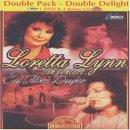 Loretta Lynn-Coal Miners Daug | DVD | (01/07/2002)
from £N/A
| Saving you £N/A (N/A%)
| RRP
Loretta Lynn-Coal Miners Daug | DVD | (01/07/2002)
from £N/A
| Saving you £N/A (N/A%)
| RRP 
Please wait. Loading...
This site uses cookies.
More details in our privacy policy